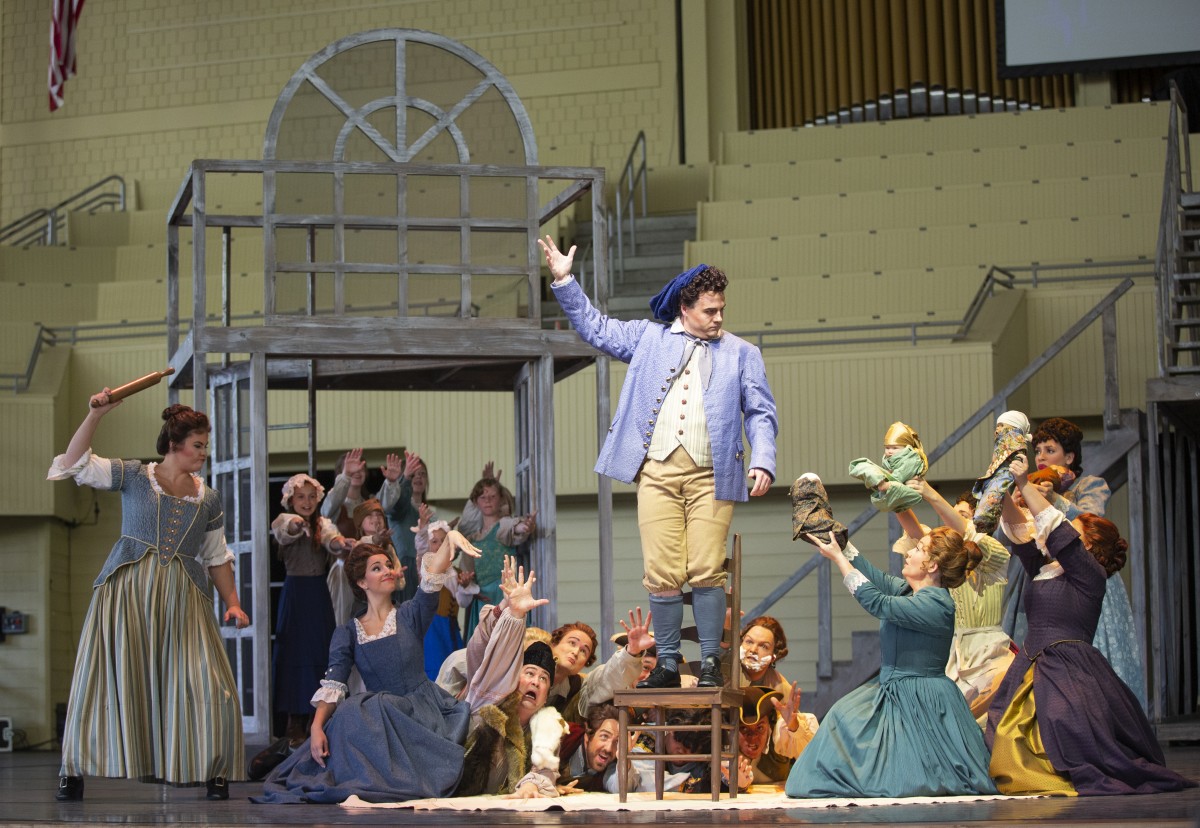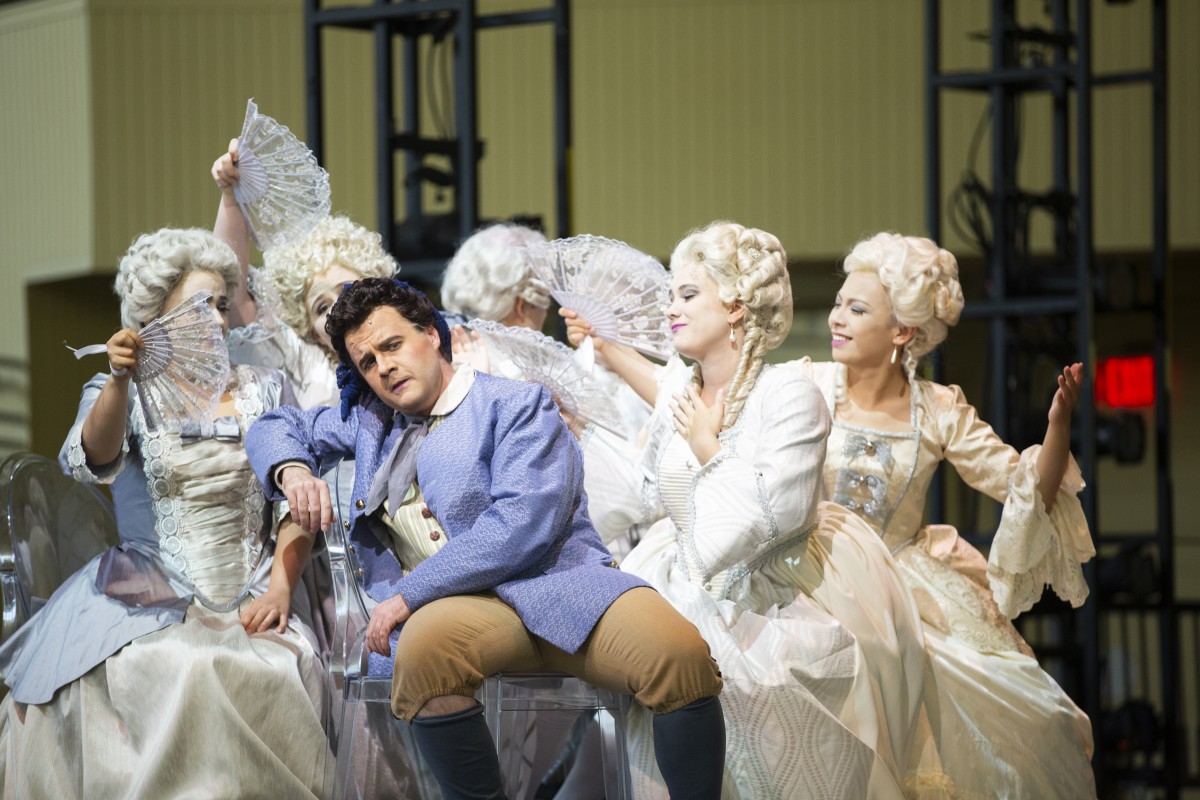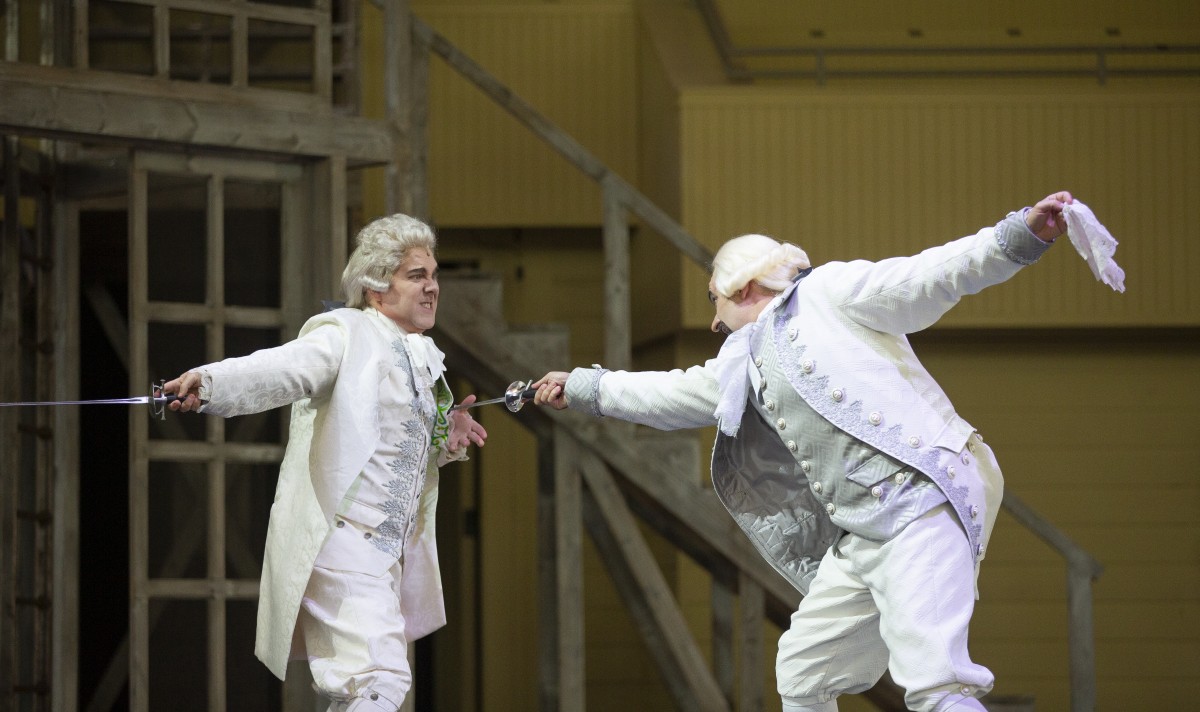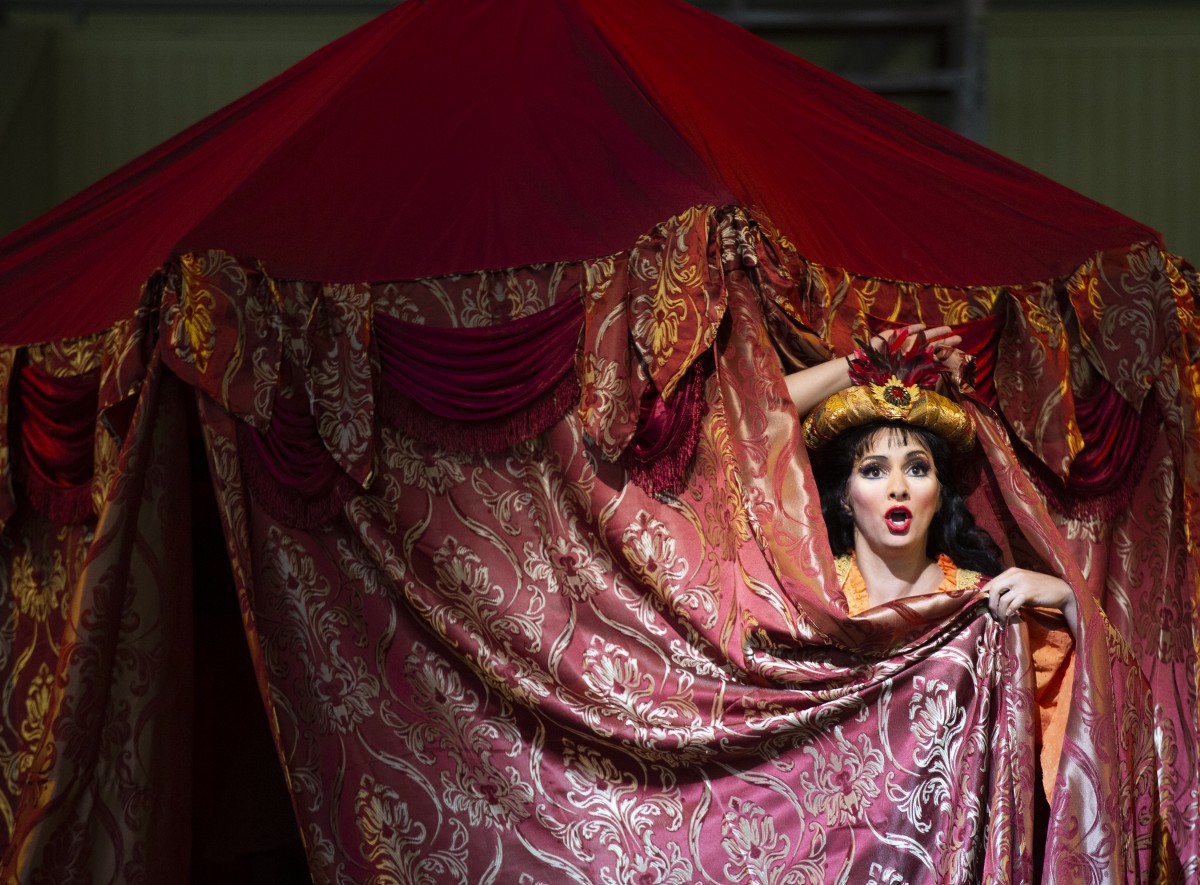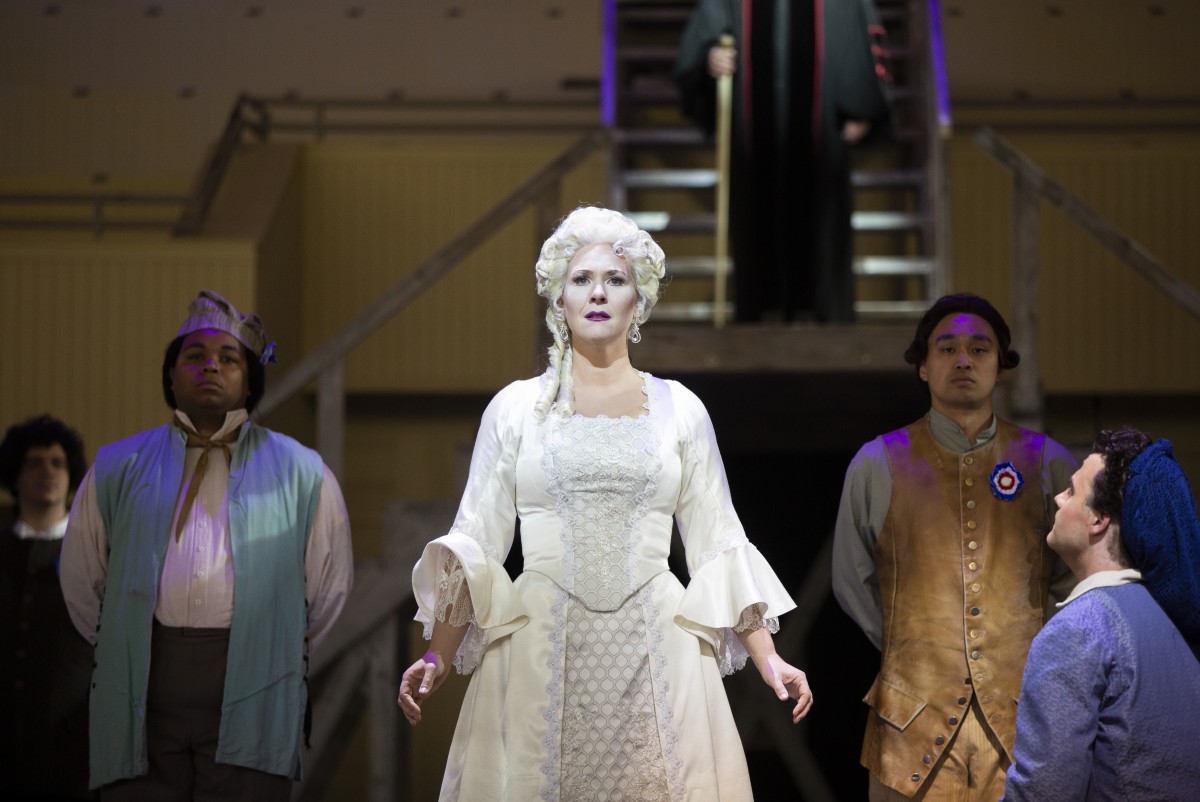A celebration honoring something as grandiose as 90 consecutive years of opera requires a production that is just as extravagant.
As the final opera in Chautauqua Opera Company’s three-day festival of the Beaumarchais Trilogy, The Ghosts of Versailles — with John Corigliano’s music and William Hoffman’s libretto — pulls audiences into different realities and emotions, with the characters they’ve come to know throughout Il Barbiere di Siviglia and ¡Figaro! (90210). The Ghosts of Versailles is a grand opera buffa, incorporating both comedy and grandiose opera songs.
At 8:15 p.m. Saturday, July 27 in the Amphitheater, the story returns to the stage, as Chautauqua Opera performs The Ghosts of Versailles, bringing Pierre-Augustin Caron de Beaumarchais’ Figaro Trilogy Weekend at Chautauqua to a close. This performance is also in celebration of Corigliano’s 80th birthday year. He will be in the audience on Saturday.
The Ghosts of Versailles Stage Director Peter Kazaras said, between the comical moments and memorable characters, the piece gives sincere insight into grief and loss.
“The things about this opera, and this is why it was a great opera for the Met and Chautauqua, is that you can take away lots of things,” Kazaras said. “You can take it as ‘funny Figaro’ or as a profound meditation on loss and grief — there’s lots of different ways you can feel about the piece.”
Kazaras fell in love with opera at a young age, and has a special history with The Ghosts of Versailles..
He didn’t choose a bouncy castle or a pool party for his 10th birthday. Instead, he chose to see the opera Boris Godunov by Modest Mussorgsky at New York’s Metropolitan Opera.
“It’s in my DNA,” Kazaras said. “My father was a singer and my mother was a musicologist, and they spent my entire childhood telling me not to be a professional musician, and I said ‘I don’t know if I believe that.’ ”
Years later, Kazaras made his Metropolitan Opera debut in that very same Mussorgsky opera. Then in 1991, Kazaras graced the Met stage as Count Almaviva in the world premiere of John Corigliano’s The Ghosts of Versailles.
“It was totally exciting,” Kazaras said. “It was a big performance — it took seven weeks of rehearsal, which is unheard of.”
Corigliano’s The Ghosts of Versailles is loosely based on the final story in Beaumarchais’ Figaro trilogy — La Mère coupable (The Guilty Mother).
The Ghosts of Versailles is a complicated piece, according to Steven Osgood, general and artistic director of Chautauqua Opera.
“But it does everything that we want in an operatic treatment of The Guilty Mother,” Osgood said.
The Characters
The story takes place in the afterlife of King Louis XVI, who is played by baritone Guest Artist Marco Nisticò. The ghost of Louis XVI’s wife, Queen Marie Antoinette, played by soprano Guest Artist Caitlin Lynch, is upset about being beheaded. To cheer her up, the ghost of Beaumarchais, played by baritone Guest Artist Daniel Belcher, stages an opera called A Figaro for Antonia, which is based on La Mère coupable.
The opera within the opera, A Figaro for Antonia, brings together Count Almaviva, played by Young Artist Blake Friedman, tenor, and Countess Rosine, played by Young Artist Lauren Yokabaskas, soprano. The two characters have run into marital issues; the count is estranged from Rosine after finding out she was unfaithful.
Their son León, who is played by Young Artist James Stevens, tenor, is the product of the infidelity and is in love with the Count’s illegitimate daughter, Florestine — played by Young Artist Natalie Trumm, soprano.
Figaro, played by baritone Young Artist Scott Purcell, and Susanna, played by mezzo-soprano Young Artist Quinn Middleman, come to the rescue. The story comes 20 years after Beaumarchais’ Le Mariage de Figaro (The Marriage of Figaro).
A Play Within a Play
In A Figaro for Antonia, Beaumarchais inserts himself into the story in an attempt to rescue Marie Antoinette from the French Revolution. During the revolution in 1793, Marie Antoinette was executed by guillotine after a trial found her guilty of high treason.
Kazaras said, to him, this is an emotional story about Marie Antoinette, as she attempts to move through her pain — particularly the pain she experienced toward the end of her life — and fall in love.
“It follows the story of The Guilty Mother, but then it includes all this stuff about Beaumarchais and Marie, which is separate,” Kazaras said. “And that, interestingly, ends up being the heart of the piece.”
Belcher played Figaro in Chautauqua Opera’s Il Barbiere di Siviglia, both earlier this season and on Thursday. For Belcher, playing Beaumarchais in The Ghosts of Versailles represents a departure — of sorts.
“Beaumarchais is Figaro, and Figaro is Beaumarchais,” Belcher said. “At the end of the opera, Beaumarchais says, ‘Goodbye Figaro, take care and safe journey — you were my favorite child.’ ”
Amid Figaro’s witty antics and the blossoming love between certain characters, Marie Antoinette endeavours to be free of her trauma. Lynch said even though Marie Antoinette is a significant historical figure, she found the queen to be more human than people think.
“Through the telling of this story, she’s a ghost, but we see her as more human,” Lynch said. “If you just come at this character from the inside, from her heart, then she’s not as daunting — at least that’s how I’ve approached it.”
‘Settling Scores’
Once Le Mariage de Figaro was performed in 1784, Beaumarchais had already begun to write La Mère coupable. Despite Beaumarchais’ successes — especially after Le Mariage de Figaro — he met many failures. Osgood said La Mère was written in a tumultuous time for Beaumarchais.
“It’s a problematic piece,” Osgood said. “He wrote it much later than the others, and he as a person had changed.”
In 1785, Beaumarchais was briefly jailed for criticism against those who wanted to ban Le Mariage. Beaumarchais and his lover of 12 years, Marie-Thérèse de Willer-Mawlas, were wed in 1786. But then, he fell into legal battles and feuded with a powerful French lawyer named Bergasse, who ended up being a central antagonist in La Mère.
Even after the lawyer lost the case, he tried to tarnish Beaumarchais’ public image. To the French people, the lawyer looked like a champion for justice while Beaumarchais stood in ill repute. This sets the mood for La Mère, where Beaumarchais put his pen to paper in the spirit of revenge.
Kazaras said La Mère showcased Beaumarchais’ bitterness toward the world.
“In The Guilty Mother, Beaumarchais was settling a lot of scores,” Kazaras said. “He had a lot of bad stuff going on. … He is one of the original self-made men of the world, and he was constantly making money and losing money, like Figaro — he was definitely interested in settling scores.”
The whispers of revolution in France started to become louder, turning into a full scale revolt in 1789. Beaumarchais’ loyalty to the crown was questioned, and he was excluded from his district’s revolutionary council.
In 1791, La Mère was accepted for production by the La Comédie-Française, but Beaumarchais withdrew it when the actors refused to work due to new literary property laws. It was staged in 1792 to an “unresponsive audience,” who deemed it “unfashionably non-political,” according to Oxford World Classics’ Beaumarchais: Figaro Trilogy, a translation by David Coward.
As he began to revise it, Beaumarchais’ life worsened. His house was ransacked by a mob, who believed he had a collection of unsold weapons. From there, he was arrested and sent to the Abbaye Prison. At the same time, Beaumarchais was involved in a scheme to buy weapons stored in Holland, otherwise known as the Dutch Guns Affair. As he traveled to Holland, his loyalties were questioned, and he fought back with a series of memoirs.
As the Dutch Gun Affair dragged on, Beaumarchais was in and out of jail, accused of profiteering and was put on a list of émigré, a list of French citizens who put themselves into political exile. The émigré required that he divorce his wife and leave France. He fled to Hamburg, Germany, where he could gather himself in peace and published a new series of self-justifying memoirs.
In 1796, he returned to France and remarried his wife. The next year, La Mère was successfully restaged. Beaumarchais dealt with more debt issues until his death in 1799.
La Mère didn’t receive an operatic version right away. In 1966, French composer Darius Milhaud was the first to complete an opera on La Mère.
“There are operas out there of The Guilty Mother that have not achieved the same repertoire status that The Barber of Seville and The Marriage of Figaro have achieved,” Osgood said.
The Ghosts of Versailles is a surreal piece of opera that will pull Chautauquans into a world of heartfelt music, Belcher said.
“(The Ghosts of Versailles) is complicated and then out comes the most sublime, beautiful, ethereal, transformative music,” Belcher said. “It’s really a love letter to Mozart, Rossini, Beaumarchais, and in many ways, Marie Antoinette.”


